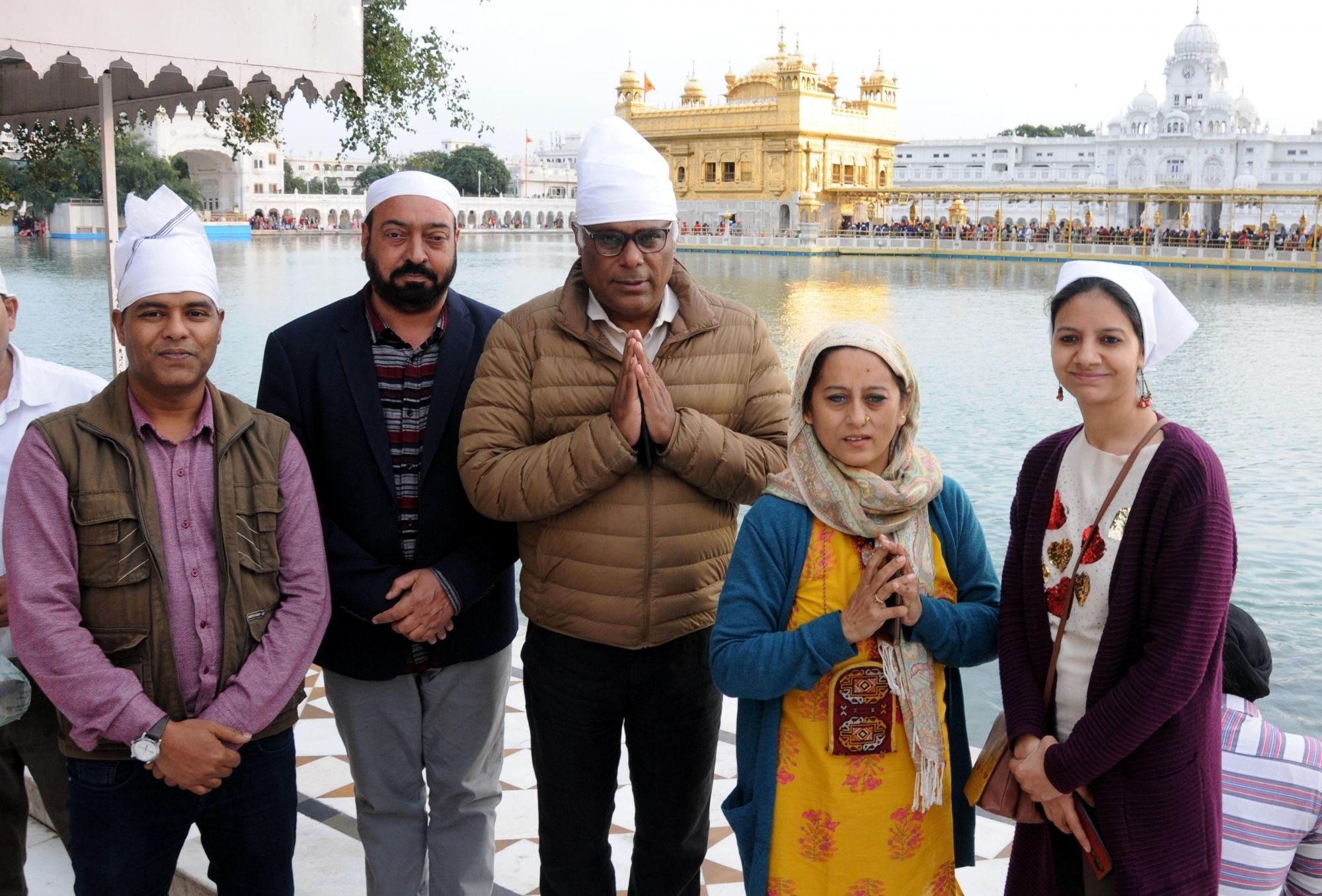|
New Delhi, Sep 1 (IANS) Drawing inspiration from the National Flag, "Saffron" completes the "Colours" short-film trilogy of husband-wife duo A.K. Srikanth and Savita Sastry that juxtaposes the ideals of the tricolour to the state of women today.
Saffron in the National Flag represents strength and courage "and we thus present a story of strength and courage of a woman in extreme adversity. It is set in a dystopian, undated period in history where women who go against the norms of society are placed in a camp called The Cell, with their memories wiped clean. This is the story of one woman in the cell who starts getting visions of her past, and soon completely realises the enormity of the crime committed by society against her so-called transgression," Savitha, a noted Bharatnatyam danseuse and choreographer who features in the trilogy, written and directed by her husband, told IANS in an interview.
"The first part, 'Green' signifies prosperity and in our film, it reflected prosperity from the point of view of a woman's freedom to choose the course of her life. In 'White', signifying truth and peace, the protagonist is caught between her own truths and the image that the world carries of her - but pursues her own path. 'Saffron' is about a woman looking at oppression in the eye. The display of courage by the protagonist in this film is as unique as the film itself," Savitha explained.
The trilogy, in fact, is a poetic representation of Savitha's own life, of how she broke loose from the rigid confines of traditional Bharatanatyam, and found her own path - that of completely changing the narrative structure of the content of Bharatanatyam performances without compromising on the technical aspects of the dance form. The narrative is applicable to one and all - the act of breaking the box and stepping out, is one of courage, resilience and self-belief.
How did the series evolve?
"Our first step in this direction was the stage production called 'Chains' in 2015," Srikanth said.
"This is the story of a woman through three stages of her life: her youth, as a middle-aged woman, and as an old lady. The production had examined how in each stage of her life, the decisions on her were made by others around her. Given that it was a stage production, there were compromises we had to make on the story as written, so that it could be played out on stage.
"However, both Savitha and I had always felt we should be telling the story as it is written - which we felt was that much richer. By 2019-20 we had moved to making dance films, and thus came the idea of filming the story of 'Chains'. At this point, it occured to us that 70 years after independence, some things never seemed to change in the lives of women. So, we juxtaposed the ideals of the three colors in our national flag to the state of women today. This led to the birth of the trilogy - where 'Green' was based on 'Chains', while 'White' and 'Saffron' are original stories," Srikanth elaborated.
This evolution "is usually the case with all our productions", Savitha said.
"It isn't usual for someone to be completely satisfied in a role of being in the backdrop while I take the limelight even though his contribution to these films is just as much if not more than mine. So, I'm not surprised that he would author a series on women's choice as a central theme - but yes, it is rare for a man to take such a stand. The pivotal force behind the execution was to be able to deliver the story as a dance film, and not just as a short film. But what was important was that the dance - the medium of delivery - disappears to become just a story telling device," Savitha explained.
Her technical prowess for over the three decades she has been performing has led critics and the audiences at large to term her 'The Dancing Storyteller' and 'Renaissance Architect of Bharatanatyam'. Through the 80s, 90s and early 2000s, she mostly performed traditional repertoires and also took steps towards full length thematic productions through her works such as "Purushartha" and "Krishna - the Supreme Mystic". In the second half of the 2000s she embarked on projects that showcased novel stories rather than stories taken from mythology or religion as is common in classical Indian arts.
Her first production, "Music Within" in 2010, took the arts world by a storm. Based on the history of music as narrated by a deaf and dumb child, the production went on to play across the globe and was much appreciated for its finesse, subtlety and entertainment values. Savitha's foray in this direction stemmed from the fact that she wanted to take Bharatanatyam to an audience that was neither conversant nor interested in the art form.
In the 2010s, Savitha and Srikanth jointly created some of their most memorable works. Written and directed by Srikanth, and choreographed by Savitha, these productions included "Soul Cages" (2012), "Yudh" (2013), and "The Prophet" (2013). "Chains" played over 100 shows in very prestigious venues across the India, as also in the US, Australia, the Middle East, South Africa and Southeast Asia.
Her work even prompted the critics to declare that she is as much "the renaissance architect of Bharatanatyam as Rukmini Devi Arundale was in her times".
In the late 2010s, Savitha and Srikanth turned their eyes on the burgeoning digital media, and decided that if the aim was to evangelize Bharatanatyam to the uninitiated, then the power of digital could not be ignored. Between 2018 and 2019, her productions that had been made for stage were recreated as dance films.
But her first original work for the digital media came about in 2019, when she performed in the short dance film "The Descent". Based on a script by Srikanth, this production showcased the free fall of a superstar, and showcased the emotions of a depressed woman in this part of her life. "The Descent" went on to win the best short film awards in the very prestigious Near Nazareth Festival, the Calcutta International Cult Film Festival, Best Global Shorts and the Top Shorts Film Festival, besides being nominated in 11 other film festivals.
Savitha and Srikanth have gone on to make other short films as well including "Awakening" and "Aparajita" - the latter being created during the lockdown.
"I see that while choices available around us have multiple forms, I think girls don't have the same latitude of choices that their male siblings get. If these films can inspire even one family to be aligned to make these choices more equitable, then I've done my job. And I say family because it takes everyone to get the job done, not just the woman herself," Savitha concluded.
(Vishnu Makhijani can be reached at vishnu.makhijani@ians.in)
--IANS
vm/skp/
Copyright and Disclaimer: All news and images appearing in our news section, search engines and social media are provided by IANS. If you face any issues related to the content/images, please contact our news service provider directly. We are not liable/responsible for any content/images related to the news service provider.
|








